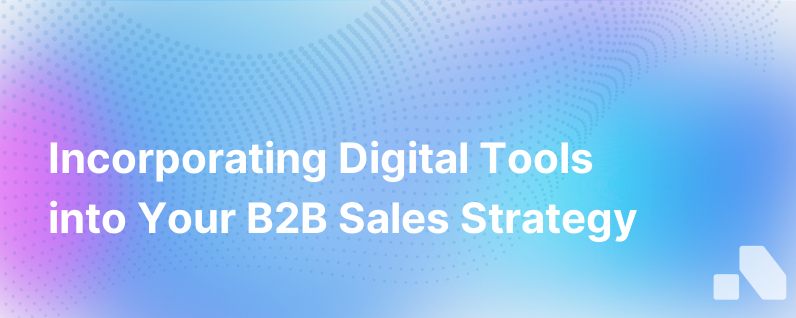Incorporating Digital Tools into Your B2B Sales Strategy
Published on December 18, 2023 by Sawyer Middeleer
In today's interconnected world, digital tools are revolutionizing how B2B sales are conducted. The implementation of technology has become an indispensable asset in building a strong sales strategy. Incorporating digital tools not only caters to a rapidly evolving marketplace but also offers numerous advantages to B2B sales processes.
The Rise of Digital Tool Incorporation in B2B Sales Strategy
The digital transformation has touched every corner of the business world, creating a new paradigm in which B2B sales strategies must adapt or fall behind. Embracing digital tools is no longer an option but a necessity to remain competitive. Sales teams harness these tools to streamline processes, enhance customer engagement, and bolster analytics for informed decision-making.
The Digital Sales Toolkit
To effectively modernize B2B sales strategies, businesses should take advantage of a variety of digital tools:
- Customer Relationship Management (CRM) Systems: A cloud-based CRM platform is the backbone of contemporary sales strategies, enabling the management of customer relationships at scale.
- Data Analytics and Reporting Tools: Through insightful analytics, sales teams can fine-tune strategies and predict trends more accurately.
- Artificial Intelligence (AI): Tools powered by AI can offer predictive insights, lead scoring, and automate mundane tasks, freeing sales teams to concentrate on the human aspects of the sales process.
- Communication Platforms: Digital communication platforms ensure seamless integration of various communication channels -- phone, email, social media -- into one unified interface.
- Content Management Systems: Storing and organizing sales materials becomes effortless, ensuring that the right content is accessible at every stage of the sales funnel.
Aligning Digital Tools with Sales Goals
Without proper alignment with business goals, digital tools can fail to deliver on their potential. B2B companies must ensure the integration of these tools aligns with the sales team's objectives and overall business strategy. A strategic fit between these tools and the sales team’s methodology is crucial for realizing their maximum benefit.
Overcoming Barriers to Adoption
Resistance to change is natural in any organization, and the digital transformation of sales processes is no exception. To overcome this, companies should focus on the following:
- Tailored Training: Comprehensive programs to educate personnel on how digital tools can facilitate their work, tailored to different learning styles.
- Change Management: Leaders must guide their teams through the digital transition through transparent communication and support.
- Continuous Feedback: Sales teams should have a channel to provide feedback on the tools, contributing to continuous improvement and customization to their needs.
The Impact of Digital Tools on Sales Execution
When executives effectively integrate digital tools into their sales apparatus, the results speak for themselves. Sales teams can experience a significant uptick in productivity as routine tasks are automated, allowing sales professionals to allocate more time to interaction with clients and prospects. Moreover, these tools can enhance customer engagement, tailoring sales pitches and content to the specific needs and behaviors of each client.
Measuring the Success of Digital Tool Integration
To gauge the successful incorporation of digital tools, businesses need to look at key performance indicators (KPIs) like sales productivity, lead conversion rates, and customer engagement levels. These metrics can offer invaluable insights into how technological tools are shaping the efficacy of sales operations. Additionally, customer feedback mechanisms can serve as a barometer to assess the improvement in customer experience due to the integration of digital tools.
Cultivating a Tech-Enabled Sales Culture
More than just adopting tools, there is a need for a cultural shift within the B2B sales environment to truly harvest the benefits. A tech-enabled sales culture embraces innovation, encourages experimentation, and views technology as an ally in achieving sales success. This cultural adjustment ensures that digital tools are properly used and constantly evaluated for effectiveness.
The Future of B2B Sales in the Digital Domain
As the digital landscape evolves, so too will the tools available for B2B sales teams. Keeping abreast of emerging technologies and trends, such as machine learning, advanced analytics, and the Internet of Things (IoT), is imperative for businesses looking to maintain a competitive edge.
Conclusion
The deliberate incorporation of digital tools into the B2B sales strategy not only delivers tangible results but also ensures sales operations are agile and responsive to an ever-changing market. A strategic, well-executed integration supports the achievement of business goals and elevates the efficiency, productivity, and effectiveness of sales teams. As B2B market dynamics continue to evolve and customer expectations rise, digital tools will become indispensable for any successful sales strategy.
Ultimately, businesses that recognize the critical role of digital tools and adopt them in their sales marathon will not only sustain but thrive. And for those who seek to maximize their sales team's potential with minimal effort, solutions like Aomni offer a seamless way to access real-time account research, competitive insights, and personalized sales content, propelling them to the forefront of the future sales landscape.
Sources:
- Maximizing CTR: B2B Digital Marketing Case Studies
- How to Unlock Value from B2B Digital Sales Tools | Publicis Sapient
- A Collection of B2B Sales Case Studies | 6sense
- B2B Sales Training in the Digital Age: A Guide for Success
- A Collection of B2B Marketing Case Studies | 6sense
- Improving Your B2B Sales Cycle with Technology Blog
- B2B Sales Training Techniques and Best Practices
- B2B Sales Culture Must Change to Make the Most of Digital Tools